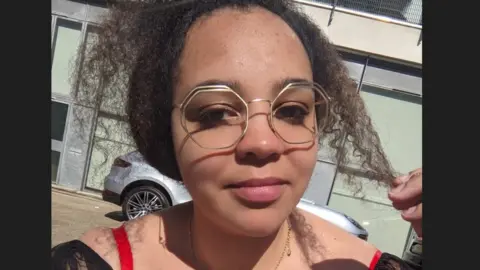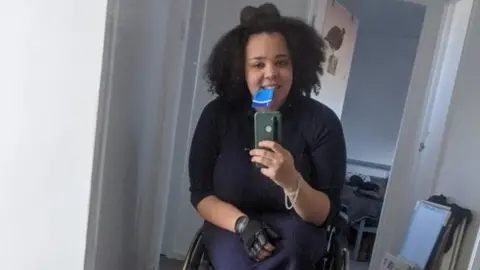Charity research finds that only 1% of disability hate crimes end with a charge
 Cassie Lovelock
Cassie LovelockOf the thousands of disability hate crimes reported to the police last year, just 1% resulted in criminal charges, two charities have revealed.
Leonard Cheshire and United Response submitted Freedom of Information requests to 43 police forces in England and Wales and 36 responded.
It found that out of more than 11,000 reports, 99% of cases went no further.
The National Police Chiefs' Council said it wanted "to understand the reasons" behind the low number.
A hate crime is an offence which targets a victim's protected characteristics, including their race, religion, sexual orientation or disability.
PhD student, Cassie Lovelock from London, told the BBC Access All podcast she has experienced physical and verbal abuse because of her disability many times.
She has hereditary neuropathy with a liability for pressure palsies (HNPP), a rare condition with similar symptoms to MS, and often uses a wheelchair.
On one occasion, while waiting for her boyfriend outside a shop, two drunk men grabbed her wheelchair and pushed her down the road while making sexual comments.
Despite screaming for help, she claims passers-by ignored her. She eventually escaped by rolling her wheelchair into the road.

Listen to Access All on BBC Sounds
On the latest episode of Access All, Cassie talks more about her experiences of disability hate crime and the team look at the support available.
And a month into Prime Minister Liz Truss's premiership there's still no confirmation about who the new Minister of State for Disabled People will be…or is there?


On another occasion, Cassie was pushed out of her wheelchair by a woman who wanted to use the wheelchair space on a London bus for her pushchair.
"It was very humiliating," Cassie says. The bus driver witnessed the incident, helped Cassie and refused to let the other woman travel.
Cassie says the incidents she has endured - including being shouted at on the street and accused of faking her disability - have all been "intrinsically tied" to her disability.
But, she admits, she hasn't always reported her experiences immediately because she wasn't sure they would be considered hate crimes.
Ali Gunn, policy lead for United Response, which was involved in the research, says Cassie's experience is common.
"A lot of the time victims don't even know they've been a victim of a disability hate crime" and, as a result, the number of reported incidents could be the "tip of the iceberg".
She says a disability hate crime is classed as "any criminal offence that is motivated by a person's disability or perceived disability".
Of those hate crimes that were reported but went no further, Ali says: "We found that around 50% of the no-charge outcomes were a result of either the victim withdrawing support, evidential difficulties despite there being a named suspect, or that the police were unable to find a suspect."
She says its "really important for the victim to capture as much information as possible - what they hear, what they see, or what's happening and the date, the time, the location".
But she adds that the whole community should play its part.
 Cassie Lovelock
Cassie Lovelock"If you witness a crime you might feel uncomfortable or nervous to go up at the time, but afterwards please support the victim. Give your phone number, give any information that you were able to record at that point in time about what happened."
The two charities - Leonard Cheshire and United Response - which conducted the research have called for police forces to appoint Disability Liaison Officers.
"They would be able to support a disabled victim from the point of reporting all the way through," Ali says, hopefully resulting in a higher charge rate.
This week, the Home Office also released its statistics on hate crimes. It reported that 14,242 disability hate crimes had been recorded in the year ending March 2022 - an increase of 43% on the previous year.
That figure has doubled since 2017/2018 with stalking and harassment offences the most commonly recorded disability hate crimes.
A Home Office spokesperson described hate crime as a "scourge on communities" and said that "while the rise is likely to be largely driven by improvements in police recording, we cannot be complacent."
They added: "[We] expect the police to fully investigate these hateful attacks and make sure the cowards who commit them feel the full force of the law."
After thinking about the incident with the men, Cassie did report it to the police. She received a call from an officer and a case number, but says she never heard from them again, putting Cassie's case in the 99% that result in no charge. The force was unable to corroborate this information.
Cassie is getting on with her PhD, but says the "terrifying" experiences have stayed with her and she has changed where she shops and which public transport she uses as a result.
"Even now, I get this anxiety - what if something happens?" she says.
You can listen to the podcast and find information and support on the Access All page.

